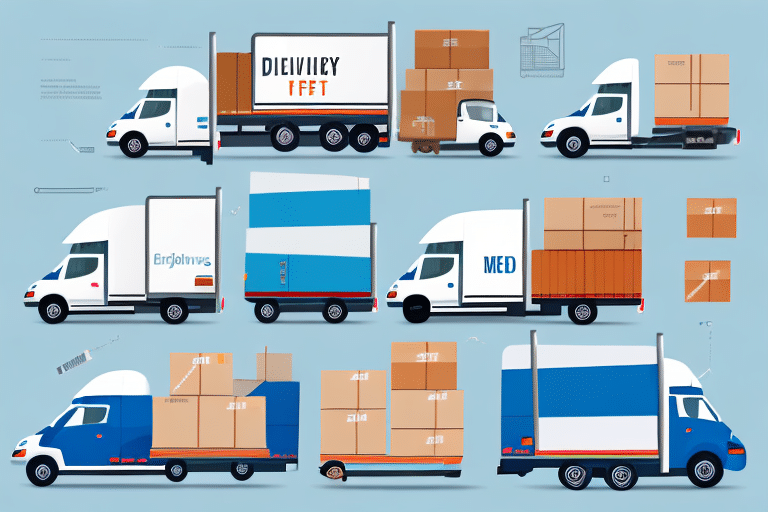Importance of Choosing the Right Freight Delivery Company
Selecting the appropriate freight delivery company is crucial for your business's operational efficiency and customer satisfaction. The right partner ensures timely deliveries, reduces costs, and maintains the integrity of your goods, directly impacting your bottom line.
Impact on Business Operations and Customer Satisfaction
A reliable freight delivery partner can enhance your supply chain efficiency, minimize delays, and ensure that products reach customers in optimal condition. According to a 2023 supply chain report, businesses with efficient logistics operations experience up to a 20% increase in customer satisfaction.
Avoiding Common Pitfalls
Choosing an inadequate freight company can lead to issues such as delayed shipments, damaged goods, and increased operational costs. These problems can erode customer trust and negatively affect your company's reputation.
Benefits of Outsourcing Freight Delivery Services
Outsourcing freight delivery allows businesses to focus on their core competencies while leveraging the expertise of specialized logistics providers. This partnership can lead to significant cost savings, improved service quality, and greater scalability.
Cost Efficiency and Resource Management
By outsourcing, businesses can reduce the need for investing in fleet management, warehousing, and personnel. According to Logistics Management, companies can save up to 30% on logistics costs by partnering with third-party providers.
Access to Advanced Technology and Specialized Services
Freight delivery companies often employ the latest technologies, such as real-time tracking and automated inventory management, which can enhance the overall efficiency of your supply chain.
Key Factors to Consider When Selecting a Freight Delivery Company
Choosing the right freight delivery partner involves evaluating several critical factors to ensure they align with your business needs and goals.
Pricing Structures and Cost Transparency
Understand the pricing models offered by different freight companies, including any hidden fees or surcharges. Transparent pricing helps in budgeting and avoiding unexpected costs.
Range of Services Offered
Assess whether the company provides the specific services you require, such as expedited shipping, international logistics, or specialized handling for fragile or hazardous materials.
Reputation and Reliability
Research customer reviews and industry ratings to gauge the company's reliability and service quality. Platforms like TrustRadius and G2 offer valuable insights from other businesses.
Safety Record and Compliance
Ensure the company adheres to safety standards and regulatory requirements. A strong safety record indicates reliable handling and a lower risk of accidents or violations.
Technological Capabilities
The use of advanced technologies, such as GPS tracking and automated logistics systems, can significantly enhance the efficiency and transparency of your shipments.
Environmental Sustainability
Consider the company's commitment to sustainable practices, such as using fuel-efficient vehicles and minimizing packaging waste. Sustainable logistics can improve your company's environmental footprint and appeal to eco-conscious customers.
Evaluating and Comparing Freight Delivery Companies
To make an informed decision, thoroughly evaluate and compare potential freight delivery partners based on key performance indicators and your specific business requirements.
Comparing Pricing and Service Offerings
Analyze the cost-effectiveness of each company, considering both pricing and the range of services provided. A comprehensive comparison helps identify the best value for your investment.
Assessing Delivery Timeframes
Different companies offer varying delivery speeds. Determine which provider can meet your delivery deadlines without compromising quality, balancing cost and efficiency.
Reviewing Customer Service and Support
Responsive customer service is essential for addressing any issues or delays promptly. Look for companies that offer 24/7 support and have dedicated account managers.
Examining Safety Records and Compliance
Investigate each company's safety records and compliance with industry regulations. Reliable safety practices reduce the risk of shipment damage and ensure regulatory adherence.
Technological Trends in Freight Delivery
The freight delivery industry is continuously evolving with technological advancements that enhance efficiency, transparency, and reliability.
Real-Time Tracking and GPS Technology
Real-time tracking systems provide visibility into shipment status and location, allowing for proactive management and timely interventions if issues arise.
Automation and Artificial Intelligence
Automation tools and AI-driven logistics solutions optimize route planning, inventory management, and predictive maintenance, leading to more efficient operations.
Blockchain for Supply Chain Transparency
Blockchain technology offers secure and transparent tracking of shipments, reducing the risk of fraud and enhancing trust among stakeholders. According to a IBM report, blockchain can significantly improve supply chain transparency and efficiency.
The Rise of Autonomous Vehicles and Drones
Autonomous vehicles and drones are poised to revolutionize freight delivery by reducing delivery times and operational costs. These technologies have the potential to enhance accessibility to remote areas and streamline the delivery process.
Specialized Freight Delivery Services
For businesses with unique shipping needs, specialized freight delivery services are essential to ensure the safe and efficient transport of specific types of goods.
Handling Oversized and Heavy Loads
Companies that offer specialized equipment and expertise can manage oversized and heavy shipments, ensuring compliance with regulations and safe transportation.
Transportation of Hazardous Materials
Freight companies with certifications and experience in handling hazardous materials provide the necessary safety measures and compliance with regulatory standards.
Temperature-Controlled Shipping
For perishable goods, temperature-controlled logistics ensure that products are maintained within required temperature ranges throughout the shipping process.
Contract Negotiation and Rates
Effective negotiation with freight delivery companies can result in favorable contract terms and cost savings for your business.
Understanding Industry Pricing Standards
Familiarize yourself with typical pricing structures in the freight industry to negotiate effectively and avoid overpaying for services.
Negotiating Based on Shipment Volume
Businesses with high shipment volumes can leverage their scale to negotiate lower rates and better service terms from freight providers.
Establishing Clear Communication and Expectations
Set clear expectations regarding delivery times, tracking capabilities, and issue resolution to ensure a smooth partnership and mutual understanding.
Future of Freight Delivery: Trends and Innovations
The freight delivery landscape is set to undergo significant transformations driven by technological innovations and changing market demands.
Adoption of Electric and Sustainable Vehicles
Increasing the use of electric vehicles in freight delivery reduces carbon emissions and aligns with global sustainability goals. Companies like Tesla and Nissan are leading the way in electric freight solutions.
Integration of Augmented Reality (AR)
AR technology can assist drivers in navigation and loading processes, improving accuracy and reducing delivery times. This innovation enhances the overall efficiency of freight operations.
Emphasis on Sustainability and Green Logistics
Freight companies are increasingly adopting sustainable practices, such as optimizing routes to reduce fuel consumption and implementing eco-friendly packaging solutions. This shift not only benefits the environment but also meets the growing consumer demand for sustainable business practices.
Enhanced Data Analytics and Predictive Maintenance
Advanced data analytics enable freight companies to predict maintenance needs, optimize routes, and improve operational efficiency. Predictive maintenance minimizes vehicle downtime and extends the lifespan of logistics assets.
Blockchain for Enhanced Security and Transparency
Blockchain continues to gain traction in freight delivery, providing immutable records of transactions and enhancing security across the supply chain.
Conclusion
Choosing the right freight delivery company is a strategic decision that can significantly impact your business's success. By considering factors such as cost, reliability, safety, and technological capabilities, you can select a partner that aligns with your operational needs and growth objectives. Staying informed about industry trends and innovations will further ensure that your logistics operations remain efficient and competitive in a rapidly evolving market.






















